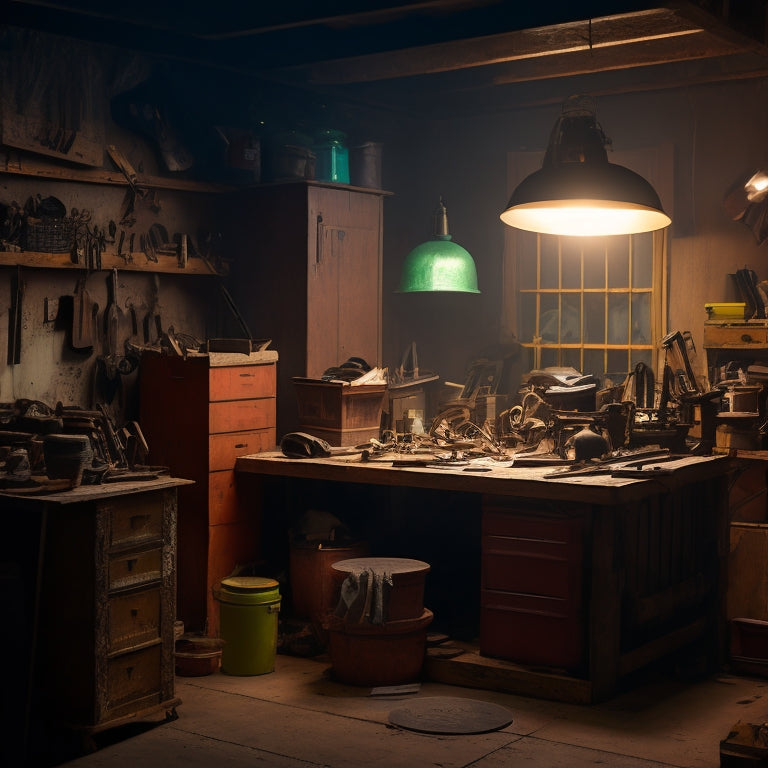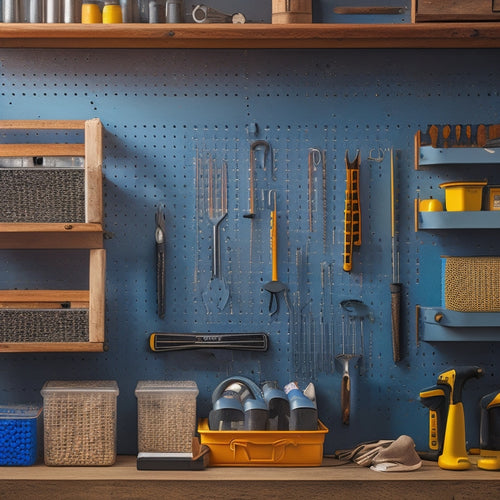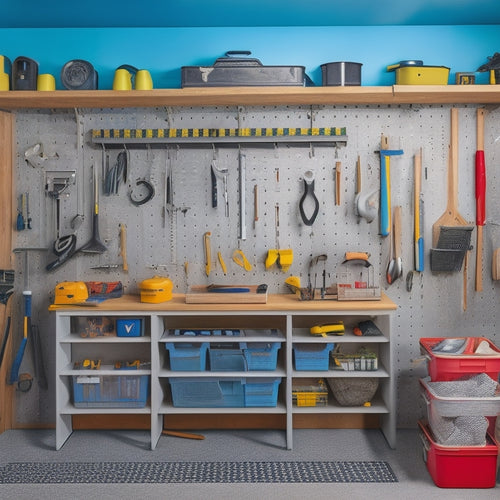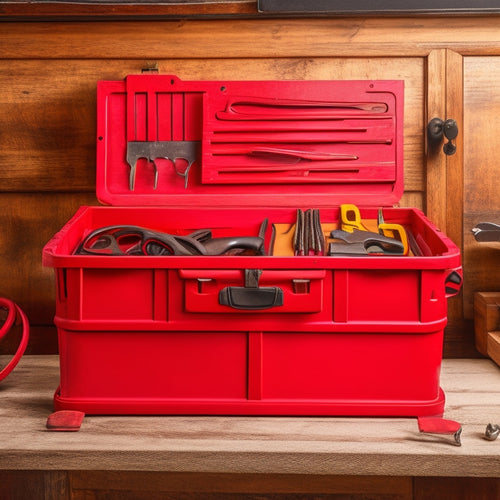
What's Holding You Back From a Clutter-Free Workshop?
Share
You're struggling to achieve a clutter-free workshop because you're overwhelmed by the sheer amount of tools and supplies, and you're not making the most of your storage space. Your workbenches and countertops are disorganized, and you haven't designated specific zones for tasks. You're not utilizing your vertical space efficiently, and your tool and supply inventory is inadequate. On top of that, your workflows and habits are unproductive, and you're not maintaining your workspace regularly. Plus, you think you can't afford organizational tools. But what if you could turn your workshop around? There's a more organized, efficient you waiting to be set free.
Key Takeaways
• Lack of assigned homes for tools and materials leads to clutter and disorganization in the workshop.
• Inadequate storage solutions, such as insufficient shelving and bins, contribute to a cluttered workspace.
• Failure to maintain a regular cleaning schedule and tackle inventory management allows clutter to accumulate.
• Insufficient labeling and categorization of tools and materials make it difficult to locate items when needed.
• Inadequate use of vertical space and inefficient workbench organization hinder efforts to achieve a clutter-free workshop.
Overwhelming Amount of Tools and Supplies
You're likely drowning in a sea of tools and supplies, with every available surface cluttered with gadgets, materials, and half-finished projects. It's overwhelming, and you're not alone. The good news is that with some simple strategies, you can reclaim your workshop and get back to serving others.
First, let's talk tool organization. Assign a home for each tool, and use storage solutions like bins, baskets, and pegboards to keep them tidy. Label everything so you can easily find what you need.
Next, tackle inventory management. Take stock of your supplies, and get rid of anything broken, outdated, or unnecessary. Implement a 'one in, one out' policy to maintain your newly organized space.
Decluttering tips: start with small areas, like your workbench or a single shelf, and work your way up. Sort items into categories, and prioritize what you use most frequently. Consider implementing a regular 'clean sweep' to maintain your progress.
Insufficient Storage Space Available
Limited storage space can stifle your workshop's productivity, forcing you to get creative with your layout and tool arrangement. You might find yourself constantly searching for misplaced items or tripping over clutter, wasting valuable time that could be spent on projects.
To overcome this hurdle, consider investing in custom shelving that fits your unique workshop needs. This will allow you to maximize your available space, keeping frequently used tools and supplies within easy reach.
Mobile carts can also be a game-changer, providing additional storage and flexibility. You can move them around as needed, freeing up floor space and reducing congestion. By strategically placing carts near workstations, you'll save time and energy by reducing the distance between tools and tasks.
Disorganized Workbenches and Countertops
Your workbenches and countertops are likely where the most critical tasks take place, but when they're cluttered with scattered tools, scraps, and unfinished projects, it's easy to get bogged down in inefficiency. Clutter prevention is key to maintaining a productive workspace.
Start by clearing everything off your workbenches and countertops, and then sort items into categories. Designate specific areas for frequently used tools and materials, and assign a home for each item. This will help you develop efficient organizing habits and reduce clutter buildup.
Implementing workspace optimization strategies will also help you stay on top of clutter management. Consider installing pegboards, hooks, or bins to keep essential items within easy reach. Labeling each storage unit will help you and others quickly identify where items are stored.
Lack of Designated Zones for Tasks
Organizing your workspace into designated zones for specific tasks helps you stay focused and efficient. It allows you to allocate the necessary tools and materials to each area and avoid clutter buildup.
When you have a clear task organization system in place, you'll find that you're more productive and able to complete projects quickly.
Start by identifying the tasks you perform most frequently in your workshop and group them into categories, such as woodworking, metalworking, or assembly. Then, assign a specific zone to each category, ensuring that the necessary tools and materials are easily accessible within each zone.
This will help you avoid wasting time searching for misplaced items and reduce the likelihood of clutter accumulation.
Inefficient Use of Vertical Space
By failing to maximize your workshop's vertical space, you're leaving valuable real estate unused, which can lead to a cluttered and disorganized work area. This oversight can result in tools and materials scattered all over the floor, making it difficult to find what you need when you need it.
To avoid this, focus on maximizing wall space by installing shelves, hooks, and bins. These vertical storage solutions will help keep your workshop organized and free up floor space for more important tasks.
Consider using wall-mounted pegboards to hang frequently used tools, and install bins and baskets to store smaller items like nuts, bolts, and screws. By doing so, you'll be able to quickly locate what you need, saving you time and reducing frustration.
Unclear Labels and Signage System
Without clear labels and signage, you're forced to waste precious time searching for what you need, leading to frustration and decreased productivity. This lack of clarity can hinder your ability to serve others efficiently, making it difficult to meet their needs on time.
To overcome this hurdle, establish a clear labeling and signage system that promotes effective organization and clear communication. This will enable you to quickly locate tools, materials, and equipment, streamlining your processes and improving productivity.
Label each storage area, shelf, and cabinet, and consider using color-coding to differentiate between categories. Create signs that clearly indicate the contents of each section, making it easy for you and others to find what they need.
Inadequate Tool and Supply Inventory
A disorganized inventory of tools and supplies can leave you scrambling to find what you need, causing delays and wasting valuable time. It's frustrating when you can't locate a specific tool or supply, and it hinders your ability to serve others efficiently.
To overcome this, it's crucial to implement tool consolidation and supply organization strategies. Start by categorizing your tools and supplies into groups based on their function or frequency of use. Then, assign a designated space for each group, ensuring everything has a clear and accessible home.
Effective inventory management is also vital. Regularly take stock of your tools and supplies, and maintain a running list of what you need to restock. This will help you avoid running out of essential items and guarantee efficient restocking.
Unproductive Workflows and Habits
You've optimized your tool and supply inventory, but now it's time to examine how you're using those tools and supplies, as inefficient workflows and habits can still hold you back from achieving your full potential. Take a step back and assess your daily routines. Are there any tasks that consistently cause frustration or delays? Identify those pain points and brainstorm ways to streamline those processes. It's possible that a simple tweak, such as rearranging your workspace or implementing a new organizational system, can make a significant difference.
Be honest with yourself – are there any unproductive routines that are holding you back? Perhaps you're spending too much time searching for misplaced items or repeating tasks unnecessarily. Take the time to re-evaluate your workflows and eliminate any inefficient processes. By doing so, you'll free up more time and energy to focus on what really matters – serving others and creating value in your workshop.
Inadequate Maintenance and Cleaning
As you work on your projects, you're probably aware that clutter can quickly build up in your workshop.
But let's take a closer look at what's really going on: are you letting messes accumulate daily, putting off deep cleaning sessions, and ignoring spills as they happen?
Daily Mess Accumulation
Clutter builds up quickly in your workshop when tools and materials aren't promptly put back in their designated places after use. This daily mess accumulation can lead to wasted time searching for misplaced items, decreased productivity, and even safety hazards. To combat this, integrate decluttering strategies into your daily routines.
| Time Management | Workspace Maintenance |
|---|---|
| Set a 10-minute timer at the end of each work session to tidy up | Designate a specific area for frequently used tools and materials |
| Prioritize tasks to make sure you're not leaving a trail of mess behind | Implement a 'one-touch rule' where you put things away immediately after use |
| Schedule regular breaks to maintain your workspace | Label and organize storage containers to promote easy access |
Infrequent Deep Cleaning
Over time, dust, dirt, and grime can accumulate in your workshop, making it challenging to find what you need and creating an environment that's conducive to mistakes and accidents if you don't regularly set aside time for deep cleaning and maintenance.
It's easy to get caught up in the daily tasks and overlook the significance of regular maintenance. However, neglecting this vital step can lead to a cluttered and hazardous workspace.
To avoid this, make proactive cleaning a priority. Set aside a specific time each week or month for scheduled deep cleaning. This will help prevent the buildup of dirt and grime, keeping your workshop organized and safe.
Consistent upkeep is key to maintaining a clutter-free workshop. By incorporating regular maintenance into your routine, you'll be able to work more efficiently and effectively.
Ignoring Spill Occurrences
When you fail to address spills and messes as they happen, you're inviting chaos and disorder into your workshop, allowing stains to set and making future cleaning tasks even more challenging. By ignoring spill occurrences, you're creating an environment where clutter and disorganization can thrive.
To combat this, prioritizing spill prevention and quick cleanup is crucial. Make it a habit to wipe down surfaces, sweep the floor, and clean tools after each use. This proactive approach will prevent messes from building up and reduce the risk of accidents.
Proper containment is also vital in preventing spills from spreading. Use trays, mats, or containers to catch any liquids or debris, making it easier to clean up and dispose of waste.
Limited Budget for Organizational Tools
You'll be relieved to know that effective organizational tools don't have to break the bank. A limited budget shouldn't hold you back from achieving a clutter-free workshop.
Instead, get creative with DIY solutions that can help you stay organized without draining your wallet.
For instance, repurpose items you already have lying around. Turn old pallets into shelving units or use mason jars to store small parts and tools. Upcycling projects can be a fun and cost-effective way to create custom organizational systems that fit your specific needs.
You can also get crafty with creative organizing ideas, such as using binder clips to manage cords or creating a pegboard using a piece of plywood and some hooks.
Frequently Asked Questions
How Do I Prioritize Decluttering When Everything Seems Essential?
"When everything seems essential, you prioritize decluttering by making tough decisions. Ask yourself, 'What can I let go of?' and 'What truly serves others?' Focus on workshop items that bring value, and let go of the rest, trusting your decision-making skills."
Can a Clutter-Free Workshop Really Improve My Mental Health?
You're wondering if a clutter-free workshop can really boost your mental health. Absolutely! By decluttering, you'll gain mental clarity, emotional well-being, and access increased productivity and creativity, empowering you to serve others with renewed energy and focus.
Are There Any Affordable Organizational Tools for Small Workshops?
You can create a clutter-free workshop without breaking the bank! Look for budget-friendly solutions like DIY projects, and space-saving hacks like vertical storage to maximize your space and get organized.
How Often Should I Reassess and Adjust My Workshop's Organizational System?
As you navigate your workshop's organizational journey, remember that regular evaluations are the compass that keeps you on course. You'll find balance by regularly reassessing and adjusting your system to maintain essential items accessible and clutter at bay.
Can I Still Have a Clutter-Free Workshop With Limited Floor Space?
You can absolutely have a clutter-free workshop with limited floor space! Focus on maximizing vertical storage and creative shelving solutions to optimize your space, making it functional and efficient for serving others.
Related Posts
-

What to Look for in a Pegboard Tool Storage Kit
When shopping for a pegboard tool storage kit, you need a system that combines customized organization, sturdy durabi...
-

Advantages of a Pegboard System in Your Garage
You can instantly alter your garage into a more organized, efficient, and productive space by installing a pegboard s...
-

Portable Tool Chest Essentials
When stocking your portable tool chest, you'll want to prioritize essential hand tools like hammers, tape measures, a...


